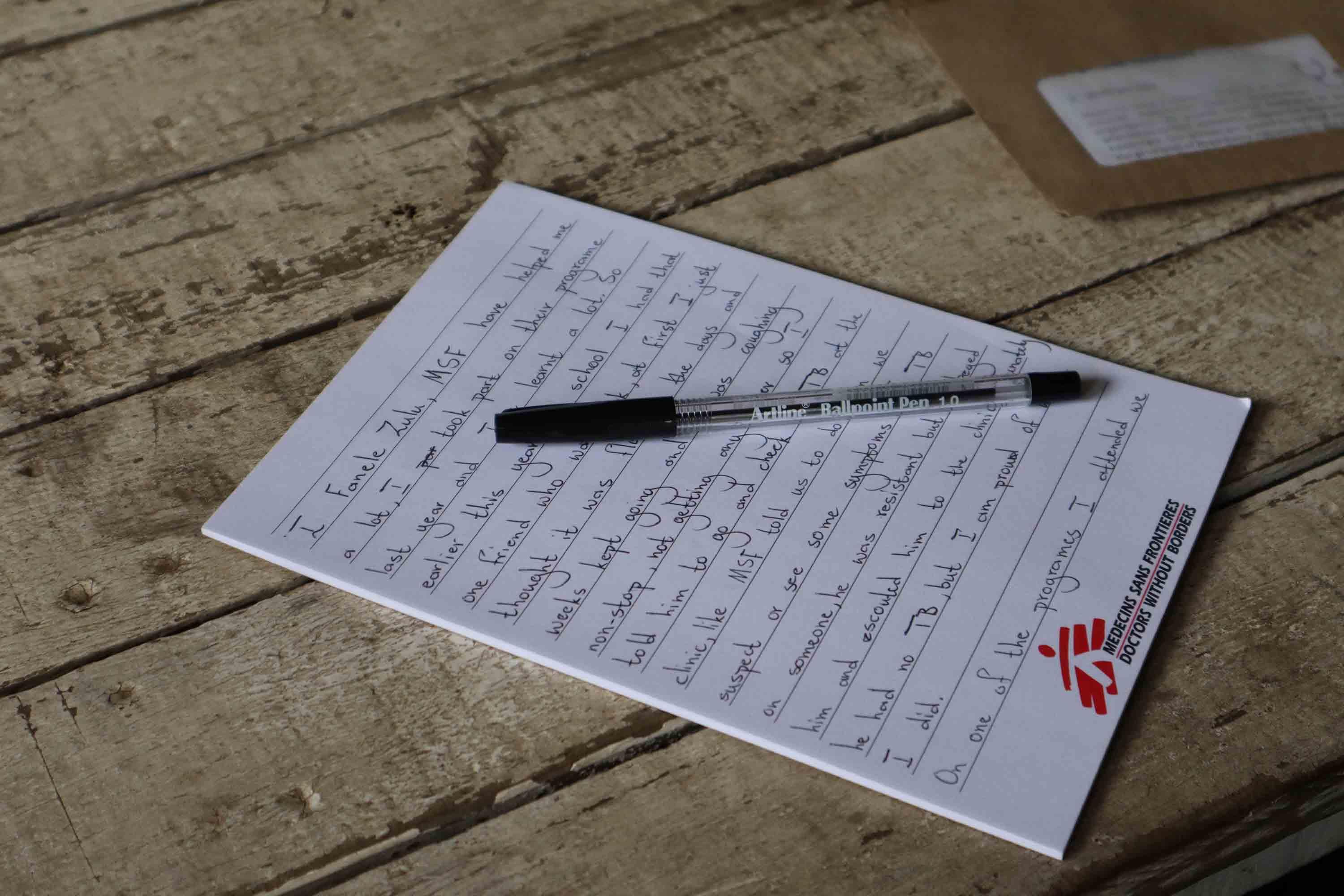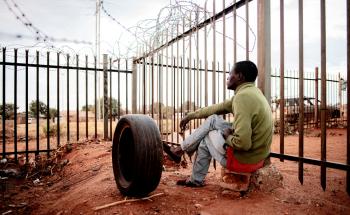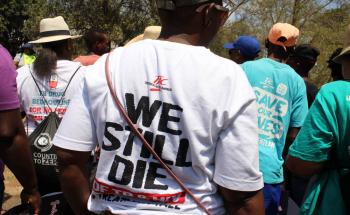How are we going to end the ancient disease of tuberculosis (TB) in a country where more than 150,000* people with active TB are “missing”, in the sense that they have not been screened, diagnosed and started on treatment, and can therefore potentially transmit the disease in communities, leading to increased suffering and death?
Increasing awareness about TB transmission and prevention among school learners can help to reduce the prevalence of the disease, research shows. In 2018, MSF and OneVoice South Africa developed a TB curriculum for grades 8 to 12 and piloted the teaching of these lessons in 22 high schools.

“The aim was to impart more comprehensive TB information in schools in order to achieve better retention of that TB information. We tested 521 learners before and after receiving TB education, and encouragingly, the pass rate rose from 22.78 percent to 77.22 among those that had gone through 5 modules,” said Liesbet Ohler, MSF medical coordinator in Eshowe.
MSF has run a successful school health programme in Eshowe and Mbongolwane since 2012, taking inspiration from the Department of Basic Education’s National Policy on HIV, STIs and TB, which stipulates that “Comprehensive Sexuality Education (CSE) will be a compulsory and timetabled subject in the curriculum, supported by appropriate Learner and Teacher Support Material and teacher training, development and support.”
The MSF school programme initially focused on HIV, aiming to reduce new HIV infections and promote prevention methods among high-school students by training teachers to impart health education. The programme was successful - over 80,000 learners were reached and 28,551 HIV counselling and testing sessions were conducted, contributing to the project area reaching the UNAIDS 90-90-90 targets two years ahead of the deadline.

Teaching about TB in schools: MSF TB curriculum in Eshowe
Yet, the MSF Eshowe team came to feel that TB was being neglected.
“The CSE curriculum, which is taught in school life orientation lessons, includes some TB information, but it is quite limited, despite the fact that TB is one of the leading causes of death among people with HIV,” Ohler said.
MSF decided to shift the focus of its school health programme from HIV to TB
76 high school teachers and learner support agents received training on MSF’s TB curriculum, and these educators, together with MSF mobilisers, delivered TB education to thousands of learners between 2018 and 2021. Learners who persisted with the curriculum tested well. In the last year of the programme, MSF added a peer education component – learners with leadership qualities in each grade were given advanced TB education to capacitate them to assist their peers and their community.
“Encouragingly, educators and learners reported that their involvement in the programme enabled them to share TB information with their families and neighbours, and thereby do their part in combating TB stigma in communities,” said Ntombi Gcwensa, MSF’s TB in Schools Programme Manager.

According to Bhekumuzi Nzuza, who works as the life orientation educator in rural Phindulimi High School outside Eshowe, “our older generations have this belief that if you cough chronically and you lose weight, which are both known TB symptoms, it is because of witchcraft. Others believe that it is because the individual has HIV. In other words, TB is misunderstood, and it is stigmatized, with the result that many people who have TB symptoms do not go to the clinic to test, and those that start TB treatment often do not complete the course due to a lack of support from their family.”
Nzuza believes that the TB in Schools programme has made a difference in his and his learners’ lives.
“The training I received has enabled me to provide TB education inside and outside the walls of our classrooms. I was able to help a friend with TB symptoms to get help, and I convinced his entire family to get tested. Now they are all on TB treatment,” Nzuza said.
*South Africa’s first national TB prevalence survey, published in 2021, found that there are an estimated 154,348 “missing TB cases in South Africa.
MSF has a long history of designing and supporting school health programs in South Africa.
Between 2012 - 2018, MSF in Eshowe ran a school HIV programme in partnership with local authorities and health facilities. The aim was to reduce new HIV infections and promote prevention methods among high-school students in grades 8 to 12, by task shifting health promotion to schoolteachers. The programme reached up to 38 high schools reached annually, provided 80,001 learners with Health Education, conducted 28,551 HIV counselling and testing sessions and performed over 10’000 male circumcisions. This school programme was one of several activities run by MSF, which resulted in the project area exceeding the UNAIDS 90-90-90 targets two years ahead of the deadline. MSF’s 2018-2021 schools TB programme built on the work of the HIV programme.
From 2018 - 2020, MSF in Rustenburg provided awareness sessions focused on sexual and reproductive health in 20 schools across Rustenburg, reaching an average of over 5 000 learners per quarter. This school programme promoted community-based clinic services for victims of sexual violence and referred learners who have experienced sexual violence to dedicated SGBV centres for necessary care and follow up.
A major component of MSF’s school programmes has been peer education – training learners with leadership abilities to disseminate information to their fellow learners in such a way that their peers will further share the information.
MSF has an even longer history of developing innovative, patient-centred TB approaches in South Africa
In 2000, MSF started a new HIV project in Khayelitsha at a time when antiretrovirals (ARVs) were not yet available due to exorbitant prices charged by pharmaceutical corporations. Since most of the patients seen by MSF were coinfected with TB, the project would soon expand its focus to include TB.
In 2004, as South Africa started its national rollout of ARVs to accredited clinics, MSF in Khayelitsha started a pilot project at Ubuntu Clinic to examine the feasibility of integrating HIV and TB services overall aim of improving the efficiency of service delivery for both conditions. This was a world first.
In 2007, MSF developed a decentralized treatment model for treating drug-resistant TB (DR TB) with the City of Cape Town health services. This model guided the ongoing movement towards decentralising TB services in South Africa.
In 2011, MSF opened an HIV/TB project called Bending the Curves in the Mbongolowane and Eshowe areas, with the objective of reducing the incidence of HIV and TB through multiple strategies.
In 2013, MSF became part of the National Department of Health’s bedaquiline clinical access programme. In 2018, after years of MSF lobbying, the National Health Department included bedaquiline in the standard treatment regimens for DR TB, replacing kanamycin, a toxic injectable antibiotic known to cause deafness.
In 2014, thanks to MSF advocacy efforts, DR TB patients could access generic linezolid, an antibiotic with proven efficacy in treating DR TB.
In 2018, MSF and partners launch the South African arm of a multi-site drug-resistant TB treatment trial called EndTB to find shorter, less toxic and more effective treatment regimens for DR TB.
After years of MSF lobbying, the National Health Department announces the replacement of older toxic injectables with a new, more effective TB drug, bedaquiline.
In 2020/21, MSF began offering home-based care to drug-resistant TB patients to shield them and their family members from possible COVID-19 infection at health facilities. In addition to this, MSF screened everyone who lives under the same roof as its TB patients and offered TB preventative treatment (TPT) to all of the healthy people in the house to prevent them from getting TB.
In 2022, following the release of the results of MSF’s groundbreaking TB-PRACTECAL clinical trial, which found a new, safer and more effective six-month oral treatment regimen for DR TB called BPaLM, the World Health Organization recommended the programmatic use of MSF’s 6-month BPaLM regimen. South Africa’s Department of Health undertook to implement a 6-month BPaLM regimen as first-line treatment for DR TB.



